A Dutch immortal unearthed
In Dutch chess literature there has been, for the past 60 years, an enigmatic immortal game: De Ronde - NN; a crazy, unbelievable, 20-move long series of sacrifices, supposedly played in a team tournament in Holland in the thirties. You never saw the whole game, always just these 20 moves, and Black's name or the event were never given. Adding to the mystery, the White player, one of the least known to ever be on a Dutch national team, seemed to have vanished in Buenos Aires after the '39 Olympiad.
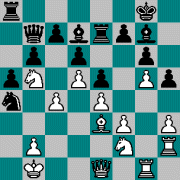
White to play
De Ronde - NN
Netherlands, 193?
1.Ng4 hxg4 2.hxg4 Ree8 3.Qh4 Kf8 4.Qh7 Nc5
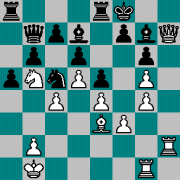
5.Nd4 exd4 6.Qxg7+ Kxg7 7.Bxd4+ Re5 8.f4
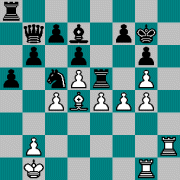
8...Nxe4 9.fxe5 Nxg5 10.e6+ f6 11.Rf1 Rf8 12.exd7 Qb8
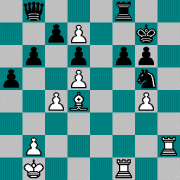
13.Rxf6 Rxf6 14.Rf2 Ne4 15.Rxf6 Qd8
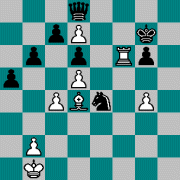
16.g5 Nxg5 17.Rxd6+ Kf8 18.Bf6 cxd6 19.Bxd8 Nf7
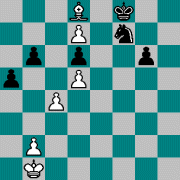
20.Bf6 and Black resigned. The inauspicious Pf3 of the first
diagram decides the game.
Not very much was known about the hero of this entrancing and flamboyant
adventure, Chris De Ronde. He had been born, probably around 1915, near
Rotterdam, and was champion of that city once or twice. He was not really
a top player, but in 1939, he qualified for the Dutch 'Candidates Tournament',
a ten-player affair the winner of which was to play a match against Euwe
for the Dutch Championship. With 3½ out of 9, De Ronde shared 7th
and 8th place (Landau won), but as quite a few strong players did not care
to go to Buenos Aires for the Olympiad that August, De Ronde, at the last
minute, was chosen to make his debut in the national team there. Playing
in one hall with the likes of Alekhine, Capablanca, Keres and Tartacover,
he didn't do badly at all, scoring 8½ in his 14 games, the second
best result of the Dutch team, which came eighth among 27.
I keep looking at the names of that team: Prins,
Van Scheltinga, Cortlever, De Groot, De Ronde. All in their twenties, all
destined to be prominent figures in Dutch chess for decades to come. And
they were. Prins, columnist, writer, arbiter, player of many more
Olympiads, champion in 1965 at 53. Cortlever, Olympiad player, team captain,
endgame composer, analyst, a strong master until well into the seventies.
Van Scheltinga, player of innumerable national championships, Olympiads,
Hoogoven Tournaments, trainer; qualifying for the Dutch Championship as
late as 1983, at 69. De Groot, who stopped early, but whose name in chess
might even outlive theirs as the author of 'Thought and Choice in
Chess'; the internationally renowned standard work on the psychology of
chess thinking.
And De Ronde? After the tournament, during which
the war had broken out in Europe, he stayed in Buenos Aires - as did some
famous players like Eliskases, Stahlberg, Najdorf, Czerniak. And then,
he disappeared. Nothing was ever heard of him again in the Dutch chess
world.
Except of course, for this crazy half-of-a-game, which keeps popping
up every so many years. Whenever Dutch chess lovers start tossing around
obscure Dutch immortals, the way other people would remember jokes, somebody
is bound to mention De Ronde-NN. But a few weeks ago, something special
happened, when in a group of chess friends, the singer and actor (and Open
Dutch Champion '57) Tabe Bas suddenly said to me: 'You know De Ronde -
Kamstra, of course.'
'De Ronde - Kamstra?' I said. 'You don't
mean De Ronde - NN, by any chance? The crazy one that ends with Bishop
f6?'
Of course Tabe meant that one - and finally I knew
the name of the loser in that game; a wellknown player of that period,
too. Moreover, Tabe was sure he could find the whole game for me. And a
few days later he sent me a photocopy of a newspaper clipping, with all
the moves. Where and when the game had been played, however, wasn't mentioned,
but the Max Euwe Center in Amsterdam unearthed that for me, too.

|
1. c4 Nf6 2. Nc3 g6 3. e4 d6 4. d4 Bg7 5. f3 Nbd7 6. Be3 e5 7. d5 a5 8. Qd2 b6 9. g4 Nc5 10. Nge2 h5 11. g5 Nfd7 12. Qc2 Nb8 13. |
So the first 30 moves had been forgotten for reason - how boring! And then, when White drops a pawn, a frenzy suddenly seems to come over him. And over his opponent - over the whole board. Maybe better let it come over us too - subjecting a game like this to the scrutiny of Rebel would be sacrilege. After 31.Ng4, White always plays the best move, or at least the move that gives the best chances, but Black... The game is so full of holes it probably shouldn't be called an immortal. There are many moves that would have stopped the adventure short; 32...Bxb5, 33...Bxb5, 34...Bxb5, 38...Ne6, 39...c5, 40...Kf8 and 45...Kh6, to mention but a few. But then again, I vaguely recall one publication saying that White had to play his last 20 moves in 1 minute. Maybe Black too, then. But if not being the result of thinking would seem to diminish the value of these moves, look at those first 30 - they are the result of thinking.
These discoveries revived my interest in the game and in De Ronde. There
are databases now, and in mine I found a partial solution of his vanishing:
aside from his 14 Olympiad games, there were 13 other games by him; one
played in Buenos Aires in 1940, and twelve from a strong Buenos Aires tournament
in 1945, with Stahlberg, Czerniak and Najdorf. De Ronde scored 1 out of
12 there.
So he had stayed in Buenos Aires at least for a
while. But after that: nothing.
What could have become of him? He hadn't returned
to Holland - he would have played chess here, or at least have met chessplayers.
I would have met him. Maybe he had died young. Or he had given up
chess to marry and raise a family. Or maybe the South American dream, the
Najdorf dream, had come true for him too - the chessplayer-turned-businessman,
lighting huge cigars with peso bills beside a pool, surrounded by beautiful
women... Or maybe he had gone out into the world, in the swashbuckling
style of that game, and he had become a rodeo rider in Arizona, or a soldier
monk in Tibet...
I knew of a rumour that at the Buenos Aires Olympiad of 1978, some of
the players of the Dutch team had discovered De Ronde was still living
there, had visited him, and had learned he was not interested in chess
anymore. Investigating this, I found out this was not true - but a Dutch
journalist, Frans van Schoonderwalt of the Volkskrant, had looked
for De Ronde, and had found him. He had even written a story about that
encounter which, because I was abroad at the time, I had missed.
Van Schoonderwalt heard De Ronde's name mentioned
by his old teammates Prins and Van Scheltinga, and by Euwe, who were in
Buenos Aires then too. Euwe vaguely remembered De Ronde as a leftist, almost
communist idealist and presumed he had died; Van Scheltinga thought that
De Ronde, opposed to war as something capitalistic, had been a conscientious
objector. To find him, Van Schoonderwalt had the stroke of genius to simply
look in the telephone book, and the luck that someone gave him an old one.
Had he used the current one, he wouldn't have found De Ronde who, as it
turned out, hadn't had a telephone connection in years. The number was
out of order, so Van Schoonderwalt just went to the address.
Nothing of what I had imagined was true. De Ronde hadn't died, hadn't
prospered, hadn't married, he didn't have six children one of whom played
chess quite well. He had stayed in Buenos Aires after the '39 Olympiad,
and he was still staying there. That was really all. The forties had come,
the fifties, the sixties and then the seventies, and nothing had changed.
His life had been like the first 30 moves of his game, not like the last
20. The only thing that had changed was that he didn't like chess anymore.
De Ronde, a well-preserved 65, lived in two small
blinded rooms, filled with books and papers, in a run-down apartment building.
He did not speak Dutch, 'that clumsy language', anymore - Van Schoonderwalt
was the first Dutchman he'd spoken to in 39 years. He was not going to
visit the chess Olympiad or Prins and Van Scheltinga - he had given up
chess long ago, it had made him too nervous. He gave private lessons in
English and mathematics, not because he liked it, but in order to survive.
In his old life in Holland, in the 'Black Thirties'
(he had been born in 1912 in
Schiedam),
he had studied mathematics in Leyden, but had not graduated. He had written
poetry - one poem, just before he went away, had been published. He had
also studied in Paris, but there, he had spent most of his time reading,
writing, and playing chess for money in the café's, ten francs a
game. He had always been leftist, and when Hitler came to power in '33,
he had felt terribly dejected, and had said to himself: 'Better to be dropped
naked in Patagonia than this.' He did not want to be in the war that seemed
inevitable, and as he was not recognized as an official conscientious objector,
and could see mobilization coming, he desperately tried to find a way to
get away, even if that would make him a deserter technically. The invitation
to play in the Buenos Aires Olympiad was a godsend - he may have been the
only player there who knew beforehand he was going to stay.
And so he did. Even if Argentine politics disgusted
him. But where should he go? He could never live in Holland, with its silly
parasitic monarchy, almost as bad as fascism. So he'd stayed, lecturing
math for a while, working for Philips, but short of having bars over the
windows, that had been jail. When they found out he was some sort of a
deserter, they had fired him anyway. He had continued writing, in English
now, his diary and poetry, but publications were not mentioned. He had
never been back to Holland, he wasn't sure he was still a Dutch citizen.
Didn't have a passport. What did he need a passport for? - he was too poor
to travel anyway. He had never thought of marrying - making someone share
your poverty wouldn't be fair. He didn't pay taxes, didn't build a pension,
wasn't registered anywhere. Nobody knew about him, and that was the way
he wanted it. He was an outcast by choice, preferring that to being a slave
in an office. And even so, he thought he was better off than most people.
But now, at 65, maybe he wanted to go away. But where?
Trying to find some information on his later years, I called all the De Ronde's in his former home town, Schiedam. There were quite a few, but most had never heard of a strong chess player De Ronde who had emigrated to Argentina long ago. One however, a distant relative, knew about him. He even had a photograph. He wasn't sure, but he thought De Ronde had died in Buenos Aires, six or seven years ago.
I can see the Hollywoodization of his life:
BIRD'S EYE PAN over big city, ZOOM IN on slums. OLD MAN leaves corrugated
iron shack, walks into the buzz of the city. CUT TO: Chess shop. Old man
looks, hesitates, stops. A great emotion comes over him. Hesitates more,
goes inside. CUT TO: old man in front of bookshelves, looking for book.
Finds it, browses it, looks at diagrams. Suddenly stops browsing. INSERT:
diagram. CLOSE UP: Old man looks at diagram very intently. His hands tremble.
His lips tremble. His eyes become moist. He trembles all over, drops to
the floor, book in his hand, opened at diagram. CUT TO: SHOP OWNER sees
something is wrong, comes over, feels old man's pulse. CUT TO: Ambulance
stops in front of chess shop, TWO MEN IN WHITE jump out, hurry inside.
CUT TO: Man in white hunched over old man, shakes head, places sheet over
face. Stretcher with body carried out of chess shop. PAN TO chess book
on floor, still opened at diagram. ZOOM IN on diagram. Diagram FADES into
same position on real chess board. Playing hall. DASHING YOUNG MAN thinking
hard, picks up knight, plays move. SPECTATORS crowd around board. Admiring
sounds hushed away. More spectators. CLOSE UP: Clock ticking, hand nearing
twelve. BEAUTIFUL GIRL holding breath. Moves hammered out on board, admiring
sounds no longer hushed away. OPPONENT is crushed. Overturns king. Wild
applause. OFFICIAL-LOOKING MAN comes up to dashing young man. 'You are
invited to play for our country.'
© Tim Krabbé, 1999
With many thanks to Tabe Bas, the Max Euwe Center, Frans
van Schoonderwalt, and L.F. de Ronde.











